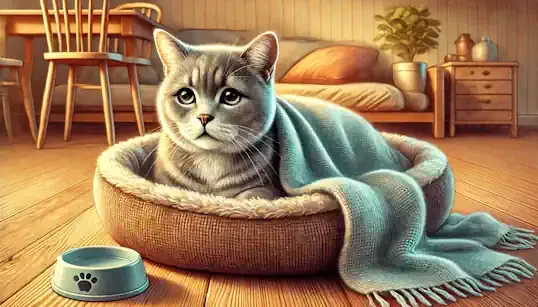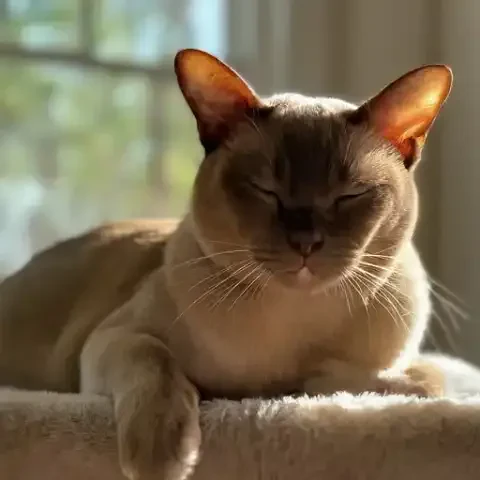Cats are enigmatic creatures, masters of subtlety and grace. They weave their way into our lives with a quiet charm, becoming cherished members of our families. But beneath their seemingly effortless composure lies a world of potential health concerns that, if unnoticed, can significantly impact their well-being. Cats, by nature, are incredibly adept at masking illness, a survival instinct honed over generations. This inherent ability to hide discomfort can make it challenging, even for the most devoted owner, to recognize when something is amiss until a condition has progressed significantly. This is why understanding the most prevalent health issues affecting our feline companions is not just a matter of curiosity, it's a cornerstone of responsible pet ownership. Proactive knowledge and awareness are your most powerful tools in ensuring a long, healthy, and happy life for your cat. By arming yourself with information about common feline ailments, you become a vigilant guardian, capable of spotting early warning signs, implementing preventative measures, and advocating effectively for your cat’s health needs. Early detection and intervention are not just about treating illnesses; they are about enhancing your cat's quality of life, minimizing suffering, and potentially adding years to your precious time together. This article will serve as your comprehensive guide, illuminating the top health concerns every cat owner should be aware of, empowering you to be a proactive partner in your cat's healthcare journey, and helping you ensure a vibrant and fulfilling life for your beloved feline companion.
Dental disease in cats is nothing short of a silent epidemic, affecting a staggering majority of felines as they age. Often overlooked, dental problems are far more than just bad breath; they represent a significant threat to a cat's overall health and comfort. We often assume a bit of halitosis is just "cat breath," but in reality, it's frequently the first, and often ignored, sign of underlying dental issues. Gingivitis, the initial stage of dental disease, involves inflammation of the gums. This early stage is often reversible with prompt intervention, but it’s easily missed as cats rarely show overt signs of pain at this point. If gingivitis is left unaddressed, it can progress to periodontitis, a far more serious condition involving the destruction of the tooth's supporting structures, including the ligaments and bone. Periodontitis causes irreversible damage, leading to tooth loosening, pain, and ultimately, tooth loss. Another incredibly common and painful dental issue in cats is tooth resorption, where the tooth structure itself is broken down by the body's own cells. These destructive lesions are intensely painful and can affect any part of the tooth. The implications of dental disease extend far beyond the mouth. The persistent pain and discomfort can significantly impact a cat's appetite and willingness to eat, leading to weight loss and malnutrition. Moreover, the bacteria present in diseased gums can enter the bloodstream, potentially affecting vital organs such as the heart and kidneys, contributing to systemic health problems. Recognizing the signs of dental disease is crucial. Bad breath, medically known as halitosis, is often the first and most noticeable symptom. Red or swollen gums, particularly along the gumline, are another key indicator. You might observe your cat drooling excessively, pawing at their mouth as if trying to dislodge something, or exhibiting difficulty eating, perhaps favoring softer foods or showing a decreased appetite overall. Loose teeth, bleeding gums, or blood in their saliva are advanced signs that require immediate veterinary attention. Prevention and management are key to combating dental disease. Regular veterinary dental check-ups and professional dental cleanings under anesthesia are essential, allowing your veterinarian to thoroughly assess your cat's oral health and remove plaque and tartar buildup, especially below the gumline where problems often begin. Home dental care, while sometimes challenging with cats, can significantly contribute to maintaining oral hygiene. Daily tooth brushing with a cat-specific toothpaste is the gold standard, but even a few times a week can make a difference. Dental diets and chews, formulated to help reduce plaque and tartar, can be helpful additions to their routine, but should not replace professional care or brushing. Early intervention is paramount. If you notice any signs of dental disease, don't delay a veterinary visit. Addressing dental issues in their early stages can prevent significant pain, tooth loss, and systemic health complications, ensuring your cat enjoys a comfortable and healthy mouth throughout their life.
Chronic Kidney Disease, or CKD, is a particularly concerning health issue, especially for senior cats. It stands as one of the leading causes of illness and mortality in older felines, a heartbreaking reality for many cat owners. CKD is characterized by the gradual and irreversible decline in kidney function. The kidneys play a vital role in filtering waste products from the blood, regulating fluid balance, producing hormones, and maintaining electrolyte balance. As kidney function diminishes, these essential processes are compromised. The progressive nature of CKD is what makes it so concerning. As kidney function deteriorates, toxins build up in the bloodstream, leading to a cascade of negative effects. Dehydration becomes a constant threat, as the kidneys lose their ability to effectively concentrate urine. Electrolyte imbalances can disrupt vital bodily functions. Ultimately, CKD can progress to organ failure, severely impacting quality of life and lifespan. Early recognition of CKD is crucial, but its insidious onset often makes it challenging. Increased thirst and urination, medically termed polydipsia and polyuria, are often the earliest and most noticeable signs. You might find yourself filling the water bowl more frequently, and noticing larger or more frequent urine clumps in the litter box. Weight loss, despite potentially maintaining a normal or even increased appetite in the early stages, is another common indicator. Lethargy, decreased appetite as the disease progresses, vomiting, and bad breath with a characteristic "uremic" odor (smelling like ammonia) are all signs that CKD may be advanced. Poor coat condition can also be a subtle clue. Diagnosis of CKD requires veterinary intervention. Bloodwork and urinalysis are essential for assessing kidney function, electrolyte levels, and detecting other related abnormalities. Blood pressure monitoring may also be recommended, as hypertension is often associated with CKD. While CKD is not curable, its progression can be slowed, and symptoms effectively managed to maintain a good quality of life for your cat for as long as possible. Management strategies focus on supporting kidney function and alleviating symptoms. Specialized veterinary diets, formulated to be kidney-friendly with reduced protein and phosphorus, are a cornerstone of CKD management. Fluid therapy, either at home through subcutaneous fluids or in the veterinary clinic, is often necessary to combat dehydration and flush out toxins. Medications may be prescribed to manage nausea, vomiting, high blood pressure, and electrolyte imbalances. With diligent management and close monitoring by your veterinarian, cats with CKD can often enjoy comfortable and fulfilling lives for months or even years after diagnosis, highlighting the importance of early detection and proactive care.
Feline Lower Urinary Tract Disease, or FLUTD, is not a single disease, but rather an umbrella term encompassing a variety of conditions affecting the bladder and urethra in cats. This complex of diseases can cause significant pain and discomfort and, in some cases, lead to life-threatening emergencies, particularly urethral blockages in male cats. Feline Idiopathic Cystitis, or FIC, is the most common type of FLUTD. It's characterized by inflammation of the bladder lining, often triggered by stress. Urinary crystals and stones, formed from mineral deposits in the urine, can irritate the urinary tract and, more seriously, cause blockages. Urinary tract infections, or UTIs, caused by bacteria, are less common in cats than dogs, but can still occur and contribute to FLUTD. Urethral obstruction, or blockage, is a true emergency, especially in male cats, whose narrower urethra is more prone to blockage by crystals, stones, or inflammatory debris, preventing urination entirely. The pain associated with FLUTD is often intense and distressing for cats. Beyond pain, urethral blockages are life-threatening because they prevent the body from eliminating toxins through urine. Recognizing the signs of FLUTD is crucial for prompt intervention. Straining to urinate in the litter box, known as dysuria, is a hallmark symptom. Frequent urination, often in small amounts, termed pollakiuria, is another indicator. Urinating outside the litter box, or periuria, particularly if this is a new behavior for your cat, should raise suspicion of FLUTD. Blood in the urine, or hematuria, is a clear sign of urinary tract irritation. Excessive licking of the genital area, vocalization during urination, and changes in litter box habits are all suggestive of FLUTD. Most critically, a complete inability to urinate, especially in male cats, is an absolute emergency requiring immediate veterinary care. Management and prevention of FLUTD are multifaceted. Veterinary diagnosis is essential to determine the underlying cause. Treatment is tailored to the specific condition. Pain medication is often necessary to alleviate discomfort. Antibiotics are used for UTIs. Dietary changes, particularly to urinary health diets, are often recommended to manage crystals and stones and adjust urine pH. Stress management plays a vital role in managing FIC, which is often stress-related. In cases of urethral blockage, immediate catheterization to relieve the blockage is crucial, often followed by hospitalization. Prevention of FLUTD involves several strategies. Increasing water intake is paramount; feeding wet food and providing fresh water sources, including water fountains, can encourage hydration. Reducing stress in your cat's environment is crucial, especially for FIC management. Maintaining a clean and readily accessible litter box is essential. Your veterinarian may recommend specific urinary health diets, particularly for cats prone to crystal formation, as these diets are formulated to promote urinary tract health.
Hyperthyroidism, an overactive thyroid gland, is a common endocrine disorder, particularly affecting middle-aged to older cats. It's characterized by the thyroid gland producing excessive amounts of thyroid hormones, which act like the body's accelerator, speeding up metabolism to an unhealthy degree. This overactive thyroid can lead to a range of systemic issues and complications. The primary concern with hyperthyroidism stems from its impact on multiple organ systems. The accelerated metabolism places significant strain on the heart, potentially leading to heart problems such as hypertrophic cardiomyopathy, a thickening of the heart muscle. Hyperthyroidism can also contribute to high blood pressure, kidney disease, and other metabolic disturbances. Recognizing the signs of hyperthyroidism is important for early diagnosis and treatment. Weight loss despite an increased or even ravenous appetite is a classic symptom. Hyperactivity and restlessness are also common, with cats often exhibiting increased vocalization and agitation. Increased thirst and urination, mirroring CKD and diabetes, are frequently observed. Vomiting and diarrhea can occur in some cats. An increased heart rate is often detectable by your veterinarian during an examination. An unkempt or matted coat can develop due to the cat’s inability or unwillingness to groom adequately. In some cases, the enlarged thyroid gland itself may be palpable as a lump in the neck area, though this is not always readily noticeable to owners and is best assessed by a veterinarian. Diagnosis of hyperthyroidism is typically straightforward through blood tests, specifically measuring thyroid hormone levels (T4). Treatment options vary and should be discussed with your veterinarian to determine the best approach for your cat. Medication, typically methimazole or carbimazole, is a common and effective treatment, usually administered as daily pills to suppress thyroid hormone production. Radioactive iodine therapy is a curative option, involving a single injection of radioactive iodine that selectively destroys the overactive thyroid tissue, but it requires specialized facilities and isolation post-treatment. Surgical removal of the thyroid gland, thyroidectomy, is another curative option, but carries surgical risks. Dietary management with iodine-restricted diets is a newer option, but may not be suitable for all cats or all cases of hyperthyroidism. Your veterinarian will help you weigh the pros and cons of each treatment option to make the most informed decision for your cat’s health and well-being.
Diabetes Mellitus, or simply diabetes, is another endocrine disorder increasingly diagnosed in cats, often closely linked to the growing problem of feline obesity. Diabetes in cats mirrors type 2 diabetes in humans, where the body either doesn't produce enough insulin, or the body's cells become resistant to the insulin that is produced. Insulin is crucial for regulating blood sugar levels, allowing glucose to enter cells for energy. When insulin is deficient or ineffective, blood sugar levels become chronically elevated. The consequences of untreated diabetes are significant and wide-ranging. High blood sugar can lead to various complications. Weight loss, despite an initial increased appetite, is common as the body is unable to effectively utilize glucose for energy. Nerve damage, or diabetic neuropathy, can develop, particularly affecting the hind legs and causing a characteristic plantigrade stance, where cats walk on their hocks rather than their toes. Diabetic ketoacidosis, or DKA, is a life-threatening emergency complication of uncontrolled diabetes. Increased susceptibility to infections and various other systemic issues can arise due to the metabolic imbalances caused by diabetes. Recognizing the signs of diabetes is important for early diagnosis and management. Increased thirst and urination, polydipsia and polyuria, are hallmark symptoms, often mirroring those seen in CKD and hyperthyroidism. An increased appetite, initially, is also common. However, despite eating more, cats with diabetes often experience weight loss. Lethargy and weakness are also common as the body struggles to utilize energy effectively. A less common but telltale sign is sweet-smelling breath, a consequence of ketone production in uncontrolled diabetes. The plantigrade stance, walking on the hocks, is a more specific sign of diabetic neuropathy. Diagnosis of diabetes is confirmed through blood glucose level measurements and urinalysis, which will reveal elevated glucose levels in both blood and urine. Management of feline diabetes typically involves insulin injections, usually administered twice daily, to replace or supplement the body's own insulin production. Dietary changes are crucial, with veterinarians often recommending high-protein, low-carbohydrate diets to better regulate blood sugar levels. Regular blood glucose monitoring at home, often using a handheld glucometer, is essential to adjust insulin dosages and manage the condition effectively. Weight management is paramount, as obesity is a major risk factor for diabetes in cats. Consistent treatment and monitoring are crucial for managing feline diabetes and preventing serious complications, allowing diabetic cats to live relatively normal and comfortable lives with proper care.
Obesity in cats, often underestimated and sometimes even seen as “cute” by owners, is a pervasive and serious health concern. It’s not merely a cosmetic issue; obesity is a gateway to a wide range of other serious health problems, significantly impacting a cat’s well-being and longevity. Obesity itself is not a disease, but it is a major risk factor for numerous debilitating and life-threatening conditions. The list of obesity-related complications is extensive and alarming. Diabetes, as discussed, is strongly linked to obesity. Arthritis and joint pain are exacerbated by excess weight placing undue stress on joints. Heart disease risk is elevated in obese cats. Liver disease, particularly hepatic lipidosis (fatty liver disease), is a serious complication of obesity. Urinary tract issues, including FLUTD, are more common in overweight cats. Obese cats face increased risks during surgery and under anesthesia. Most significantly, studies have shown that obesity can demonstrably reduce a cat’s lifespan. Identifying obesity in your cat involves more than just visual assessment, although a rounded appearance and lack of a defined waistline are often indicators. Body condition scoring is a standardized method veterinarians use to assess body fat. It involves feeling for the ribs, which should be easily palpable with a slight fat covering, assessing for a visible waist tuck when viewed from above, and feeling for an abdominal fat pad. Regularly weighing your cat and monitoring for weight gain is essential. Your veterinarian can perform a body condition assessment during wellness exams and help you determine if your cat is overweight or obese. Prevention and management of obesity are crucial for safeguarding your cat’s health. Portion control is paramount; feeding measured meals rather than free-feeding is essential. Choose a high-quality, species-appropriate diet, focusing on protein and limiting carbohydrates. Increase your cat’s activity levels with interactive playtime and environmental enrichment to encourage exercise. Avoid overfeeding treats, which often contribute significantly to calorie intake. If your cat is already overweight or obese, a gradual weight loss program under veterinary guidance is essential. Rapid weight loss in cats can be dangerous and lead to hepatic lipidosis. A slow, steady approach, combined with dietary adjustments and increased activity, is the safest and most effective way to help your cat achieve and maintain a healthy weight, significantly reducing their risk of developing obesity-related health problems.
Feline Upper Respiratory Infections, often referred to as “cat flu” or URIs, are highly contagious respiratory illnesses, particularly prevalent in kittens, shelter cats, and multi-cat households due to their ease of transmission. These infections are primarily caused by viruses, most commonly feline herpesvirus and feline calicivirus. Bacteria can sometimes play a secondary role, causing more complicated infections. URIs, while often not life-threatening in healthy adult cats, can be quite uncomfortable and debilitating, particularly for young kittens or cats with weakened immune systems. Complications such as pneumonia can develop, especially in vulnerable cats. Furthermore, feline herpesvirus infection can become chronic in some cats, leading to recurrent episodes of symptoms throughout their lives. Recognizing the signs of a URI is important to seek veterinary care and prevent further spread. Sneezing and nasal discharge, ranging from clear to colored mucus, are hallmark symptoms. Coughing, though less common than sneezing, can occur. Eye discharge, often with conjunctivitis (inflammation of the conjunctiva, the pink tissue around the eye), is frequently present, leading to watery eyes. Lethargy, decreased appetite, and fever are systemic signs of illness. Mouth ulcers, particularly with calicivirus infection, can be painful and contribute to decreased appetite. Management and prevention of URIs involve veterinary intervention and supportive care. Veterinary diagnosis is important to rule out other conditions and guide treatment. Treatment is typically supportive, focusing on managing symptoms, providing rest, ensuring hydration, and encouraging eating. Antibiotics are generally not effective against the viruses that cause URIs, but may be prescribed if secondary bacterial infections are suspected. Antiviral medications may be used in severe cases, particularly with feline herpesvirus. Isolation of infected cats is crucial to prevent further spread of the highly contagious viruses, especially in multi-cat households or shelters. Vaccination is a key preventative measure. Core vaccines for cats include protection against feline herpesvirus and feline calicivirus, significantly reducing the severity of illness if a vaccinated cat is exposed. Good hygiene practices, such as frequent handwashing and cleaning the environment, especially in multi-cat settings, are essential to minimize the spread of URI viruses.
Parasites, both internal and external, pose ongoing threats to feline health, requiring diligent preventative measures and prompt treatment when infections occur. Parasites can be broadly categorized as external and internal. External parasites, residing on the cat's skin or coat, include fleas, ticks, and mites, such as ear mites and mange mites. Internal parasites live within the cat's body, and include intestinal worms like roundworms, hookworms, and tapeworms, as well as heartworms, though heartworm infection is less common in cats than dogs. Parasite infestations can lead to a variety of health problems. External parasites can cause skin irritation, intense itching, allergic reactions, and anemia in severe flea infestations. Ticks can transmit serious diseases like Lyme disease, although less common in cats than dogs. Mites can cause skin irritation and ear infections. Internal parasites can lead to malnutrition as they steal nutrients from the host, vomiting, diarrhea, anemia, and respiratory issues in the case of lungworm. Heartworm disease, while less frequent in cats, can cause significant heart damage and is potentially fatal. Some intestinal worms have zoonotic potential, meaning they can be transmitted to humans. Recognizing the signs of parasite infestations is important for timely intervention. Signs of external parasites include excessive scratching and licking, hair loss, visible fleas or ticks crawling on the coat, “flea dirt” (flea feces appearing as black specks in the coat), and ear scratching and head shaking suggestive of ear mites. Signs of internal parasites are more varied and may include vomiting, diarrhea, weight loss, a pot-bellied appearance in kittens, coughing (with lungworm), lethargy, and a poor coat condition. Prevention and management of parasites are crucial for feline health. Year-round parasite prevention using veterinarian-recommended products is highly effective in preventing infestations. These products are available in topical, oral, and collar forms, providing protection against fleas, ticks, heartworms, and some intestinal worms. Regular deworming is particularly important for kittens, as they are often born with intestinal worms acquired from their mothers. Heartworm prevention is especially important in heartworm-endemic areas, though it’s recommended year-round in most regions due to the increasing prevalence of mosquitoes. Environmental control measures, such as flea and tick control in your home and yard, can further reduce parasite exposure.
Cancer, unfortunately, is a reality for many cats, particularly as they age. The risk of developing cancer increases significantly with age, making it a more prevalent concern in senior felines. Cancer is not a single disease, but encompasses a vast array of diseases characterized by the uncontrolled growth of abnormal cells. Various types of cancer affect cats, including lymphoma (cancer of the lymphocytes, a type of white blood cell), mammary cancer, skin cancer, squamous cell carcinoma, fibrosarcoma (cancer of connective tissue), and many others. The devastating nature of cancer lies in its potential to be life-threatening, depending heavily on the type, location, and stage of the cancer. Early detection and treatment are crucial for improving prognosis in many types of feline cancer. The signs of cancer in cats are incredibly varied and often subtle, depending on the type and location of the tumor. General signs that should prompt veterinary investigation include any unexplained lumps or bumps, unexplained weight loss, decreased appetite, lethargy, vomiting and/or diarrhea, difficulty breathing or coughing, changes in urination or defecation, non-healing wounds, and any signs of pain. Diagnosis of cancer requires veterinary expertise and a range of diagnostic tools. A thorough physical exam is the first step. Imaging techniques such as X-rays, ultrasound, and CT scans are often used to visualize internal organs and tumors. Biopsies, taking a tissue sample for microscopic examination, are essential to confirm a diagnosis of cancer and determine the specific type. Treatment options for feline cancer are continually advancing. Surgery may be an option to remove tumors. Chemotherapy is used to target cancer cells throughout the body. Radiation therapy can be used to target localized tumors. Palliative care, focusing on pain management and quality of life, is an important aspect of cancer management, especially for advanced or untreatable cancers. Early detection significantly improves the prognosis for some types of cancer in cats, underscoring the importance of regular veterinary wellness exams and prompt investigation of any concerning signs.
Arthritis and joint pain are incredibly common in older cats, often affecting a significant percentage of senior felines. Despite its prevalence, arthritis is frequently underdiagnosed in cats because they are masters at concealing pain. Owners often attribute subtle changes in behavior to “just getting old,” when in reality, their cat may be suffering from chronic joint pain. Arthritis, or degenerative joint disease, involves the progressive breakdown of cartilage within joints, leading to pain, inflammation, and reduced mobility. The chronic pain of arthritis significantly impacts a cat's quality of life, reducing their activity levels, willingness to play, and overall happiness. It can also lead to behavioral changes as cats try to cope with discomfort. Recognizing the signs of arthritis in cats requires careful observation, as they are often subtle and easily missed. Decreased activity levels and sleeping more are common but non-specific signs. Reluctance to jump or climb, previously enjoyed activities, is a more suggestive indicator. Stiffness, particularly noticeable after rest or sleeping, and limping, though often intermittent in cats, can be present. Changes in grooming habits, leading to an unkempt coat, especially in areas that are difficult to reach due to joint pain, are often observed. Irritability or aggression when touched in certain areas, especially painful joints, may develop. Hiding or withdrawing more, and elimination outside the litter box due to difficulty getting into the box, can also be behavioral manifestations of arthritis pain. Management of feline arthritis focuses on improving comfort and quality of life, as arthritis is a chronic and progressive condition. Veterinary diagnosis, through physical exam and often X-rays to assess joint changes, is important to confirm arthritis. Pain medication is a cornerstone of arthritis management in cats. Non-steroidal anti-inflammatory drugs (NSAIDs), opioids, and other pain relievers may be prescribed. Joint supplements, such as glucosamine and chondroitin, may provide some benefit in supporting joint health. Weight management is crucial, as excess weight exacerbates joint pain. Environmental modifications to make the home more arthritis-friendly, such as providing ramps for easier access to furniture, softer bedding, and lower-sided litter boxes, can significantly improve comfort and mobility. Physical therapy and low-impact exercise may also be recommended in some cases. The goal of arthritis management is not to cure the condition, but to effectively manage pain, maintain mobility, and ensure your cat enjoys a comfortable and fulfilling life despite their arthritis.
Prevention and early detection are the most powerful tools you have in protecting your cat from these top health concerns. Regular veterinary wellness exams are absolutely essential, ideally annually for adult cats and more frequently, such as bi-annually, for senior cats. These proactive check-ups allow your veterinarian to perform comprehensive health assessments, screen for early signs of disease, and provide preventative care such as vaccinations and parasite prevention. Beyond vet visits, diligent daily observation of your cat at home is paramount. Become attuned to your cat’s normal behavior, appetite, litter box habits, physical appearance, and overall demeanor. Being aware of their “normal” will make you much more likely to notice subtle changes that could signal a developing health problem. Providing a healthy lifestyle is fundamental to preventative care. Feed your cat a high-quality, species-appropriate diet, and practice portion control to maintain a healthy weight. Ensure fresh water is readily available at all times. Create an enriching environment to reduce stress and encourage activity. Regular grooming is not only beneficial for coat health, but also provides opportunities to check for lumps, bumps, or skin changes. Year-round parasite prevention, using veterinarian-recommended products, is essential to protect against fleas, ticks, heartworms, and intestinal parasites. Home dental care, even if it’s just occasional tooth brushing or dental chews, can contribute to maintaining oral health between professional cleanings. Most importantly, remember the mantra: “when in doubt, call your vet.” If you notice any changes in your cat’s behavior or health that concern you, even if they seem minor, don't hesitate to contact your veterinarian’s office. Early intervention is almost always more effective and less costly than treating advanced disease.
In conclusion, knowledge is power, and when it comes to the health of our feline companions, being informed is the first and most crucial step. Understanding the top health concerns that cats face empowers you to be a proactive and responsible cat owner. Early detection, preventative care, and informed decision-making, guided by your veterinarian, are the cornerstones of ensuring a healthier, happier, and longer life for your cat. Schedule those regular vet visits, observe your cat closely each day, and trust your instincts when something doesn't seem quite right. By being vigilant, proactive, and deeply attuned to your cat’s needs, you not only safeguard their health but also strengthen the extraordinary bond you share, ensuring many years of joyful companionship and feline love.




